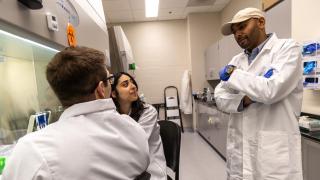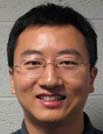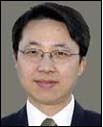
There is an exciting trend happening within UM-Dearborn’s College of Engineering and Computer Science: bright, young professors are earning national accolades for their scholarly pursuits. Three professors – Kai Zeng, Habib Ammari and Shengquan Wang – are completing research funded through National Science Foundation Early Faculty Career Development Awards.
The award, also known as the CAREER Award, is NSF’s most prestigious honor for young faculty members.
“These awards demonstrate the value of the work that each of these professors will complete in the field of computer science, encouraging them in their scholarly pursuits,” says Subrata Sengupta, dean of the College of Engineering and Computer Science.
“To have three faculty members completing research through the CAREER program is a testament to the quality of our faculty as both educators and researchers.”
For the professors, research is an essential aspect of their job, strengthening the in-classroom and research experiences for UM-Dearborn students.
“If you only teach, you may not know what is going on in your field. Now, we bring research into the classroom, making our students aware of the latest developments,” Ammari says. “Teaching and research go hand in hand.”

Zeng, assistant professor of computer and information science, received the CAREER Award last month. His research interests are in wireless networking and cyber security. The award will enable him to conduct a comprehensive study toward reliable and efficient network monitoring in white space cognitive radio networks.
“People use wireless networks every day. Wireless traffic is expected to increase more than 20 fold in five years,” Zeng says. “How to support this increase is an ongoing challenge.”
That challenge, he says, is comparable to one engineers face when roads become too crowded. “You want to fit a lot of cars on one road. Options might be to broaden the road or use parts of the road more efficiently. Similarly, the spectrums on which we communicate wirelessly have become crowded due to demand. Now we are looking for ways to communicate and compute as efficiently as possible.”

Ammari, associate professor of computer and information science, received the CAREER Award June 2011. Previously, he had earned a three-year NSF Research Grant Award in 2009.
In his latest project, Ammari will work on a framework for achieving scalability and sustainability in three-dimensional wireless sensor network deployments.
“Sensor networks are everywhere,” he explains. “Applications for individual consumers range from home sensor networks to turn off lights, to parking lot sensor networks to guide drivers to open space. This project will help develop high-efficient sensing applications so that users consume only what they need.”

Wang, assistant professor of computer and information science, received the CAREER Award in 2008. With a focus on sustainable real-time computing, Wang’s project is to provide timing-guaranteed services for real-time applications while maintaining safe temperature levels for processors.
“From a software perspective, we can manage thermal behavior by reducing the speed of the processor or going into sleep mode. But real-time embedded applications like avionics, flight control and vehicles are timing sensitive,” he explains. “The question is, ‘How do we find the balance between the two needs?’”
The professors plan to work with graduate students in their research and to develop curriculum based on their findings.
As they reflect on the recognition, the professors see the grants as way to further the work of the University’s program.
“The CAREER Award tells me that people trust what I am doing and support my ideas in research,” Ammari says. “It also allows us to build our reputations and the reputation of the program at UM-Dearborn, showing that we are active in research and in the community.”
Wang agrees, saying, “This is a good start for our Ph.D. program. The research that faculty members complete through the awards will help us build the program, attracting more researchers, more funding and more students.”




